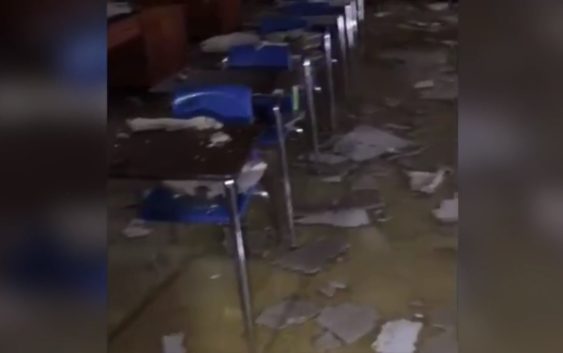- Even light rain causing flash flooding issues on Houston's north side
- LIST: High water locations, street flooding as heavy rain falls in the Houston area
- China on Alert for Heavy Rain and Floods From Typhoon Gaemi
- Flash flood threat; A day to be Weather Aware
- Power-Thirsty Bitcoin Miners Are Flooding the Energy Center of Texas
Teachers in schools hit hard by Hurricane Florence should get paid, NC lawmakers say

More than two weeks after Hurricane Florence tore through North Carolina, thousands of students are still not back in class and many schools need repairs.
On Tuesday, state lawmakers will return to Raleigh for a special session to provide storm relief, with schools among the top items to be addressed. Legislative leaders said they’ll move this week to provide money for school employees in the disaster areas who have been out of work since the storm hit and to give school districts flexibility on making up the instructional time that’s been lost.
“We think it’s very important to make sure that the teachers and school personnel are kept whole in their income and to make sure that the school districts have the flexibility that they need to make up the instructional time,” Rep. Nelson Dollar, a Cary Republican and the top House budget writer, said Monday.
Dollar said the money would be provided as if the school employees worked throughout September. It would cost an additional $5 million, he said, with the amount covering what school districts would have received in money for meals had they been open.
The proposed legislation means school employees in the disaster areas won’t have to use vacation days or personal time to get paid.
“We’re going to provide money so they don’t miss a paycheck,” added Rep. Craig Horn, a Union County Republican and co-chairman of the House education committee “These people can’t go without incomes. They lost their homes.”
But Horn said many things still need to be addressed, including how much of the time that schools lost will be forgiven, what options will be allowed to make up the lost time and how much state money will be provided to fix damaged schools. Horn said lawmakers will likely continue to deal with issues related to Florence in next year’s regular legislative session.
“We’re going to have to take several bites at the apple,” Horn said. “It’s not something we can fix in one sweep. Some things are unfixable.”
Florence made landfall Sept. 14, but several school districts closed ahead of the storm’s arrival. The storm would ultimately cause most of the state’s public school students to miss at least some time, with southeastern North Carolina particularly hard hit.
At least nine school districts were still closed as of Monday, according to Jack Hoke, executive director of the N.C. Schools Superintendents Association. Some students will miss more than three weeks of classes.
Under state law, school districts must offer at least 185 days of classes or 1,025 hours of instruction each school year.
Superintendents from 10 southeastern North Carolina school districts sent a letter last week to state lawmakers asking for flexibility to extend the school year past June 9 to make up the lost time. Under the state’s school calendar law, traditional-calendar schools must end the school year by the Friday closest to June 11.
Considering all the “trauma” that families have experienced from the storm, the superintendents said it would be “too much to ask for educators and students” to make up the lost time on weekends and holidays.
The superintendents also want flexibility from having to meet state-mandated K-3 class size limits since available school space may be limited.
“Hurricane Florence has developed into an event of historic proportions,” the superintendents say in their letter. “As a group of educators, we are begging for the opportunity to have some flexibility to determine what is best for our employees and our students for this school year.”
The state’s tourism industry fought for the school calendar law and has helped defeat efforts to repeal or make major changes to the legislation. But in the face of Florence, there’s some willingness to compromise for this school year.
“I’d say that these are highly unusual circumstances, and we recognize that flexibility is warranted in this situation,” said Lynn Minges, president of the N.C. Restaurant & Lodging Association.
Horn said extending the school year past June 9 is not a preferred option because many people have already made plans for the summer, such as employment and travel. He said there are other options schools can use such as extending the length of the school day.
While they should give flexibility, Horn said he doesn’t think lawmakers should let school districts wipe out all the time that’s been lost. Some of the students who most need the help academically were in districts that were among the hardest hit, he said.
“We want to make sure every student has the opportunity to get the coursework they need this year,” Dollar added.
Horn said he’d like to give at least some districts affected by the storm flexibility in meeting K-3 class size limits.
After they’ve had more time to assess the damage, Horn and Dollar said lawmakers will move to address other issues such as funding to repair damaged schools. The state Department of Public Instruction will provide a presentation on the storm’s impact on public schools at Wednesday’s State Board of Education meeting.
“I am confident that the legislature will do what they can to help the impacted districts,” said Hoke of the Superintendents Association.
T. Keung Hui: 919-829-4534, @nckhui